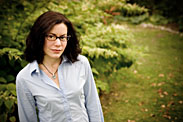Bridging Heaven and Earth
It seems there are no bounds to the subjects that can now be united as the traditional boundaries between academic disciplines blur. Last year, McGill became the first university in Canada to create a joint appointment between science and religion — two areas with often opposing world-views. Lisa Sideris, assistant professor at the McGill School of Environment (MSE) and Faculty of Religious Studies, is working hard to end the conflict. The current thrust of Sideris's work is the development of an environmental ethic acceptable to both science and religion — a specialization known as ecotheology.

Lisa Sideris, assistant professor in the McGill School of Environment and Faculty of Religious Studies
Claudio Calligaris
"It is not uncommon for religious faculties to hire people with scientific experience; what makes this position so unique is the joint appointment between the two disciplines," explained Sideris, who divides both her research and teaching commitments between the MSE and the Faculty of Religious Studies. Growing up in the U.S. Bible belt, Sideris was naturally drawn to religion from an early age. "There was a lot of conflict between science and religion in the Indiana school system where I was educated," said Sideris, who even recalls book-burning events from her childhood. "I became interested in the compatibility of the two — particularly the issue of suffering in nature."
Ecotheology, which involves the development of an environmental ethic shared by both science and religion, arose in the '70s as the environmental movement gathered steam. "Some religions, such as Buddhism, are assumed to lend themselves well to environmental issues," said Sideris. "Others, particularly Christianity, are heavily criticized for an irresponsible environmental attitude." For decades, debate has raged over whether existing moral consideration could be applied to nature — including both non-human and non-sentient life — or whether a whole new paradigm of ethics should be created.
"The search for environmental meaning in religious scriptures can lead to misinterpretation," said Sideris. "This is particularly the case in Old Testament stories — one of the few places in the Bible where ambiguous references to the environment can be found." The Book of Genesis includes many vague and often conflicting stories. For example, there are two different accounts of the Creation in Genesis, each containing a different sequence of events. "Some people interpret the order in which organisms were created to have bearing on their importance," explained Sideris. In one of these stories, Eve is created after all other animals in the Garden of Eden. Does this mean women stand on nature's bottom rung? Or was God saving the best for last? "Interpretations of these stories can lead to opposing conclusions and often raise more questions than answers," explained Sideris.
Reconciling these differences is a complex task, but according to Sideris, the development of an environmental ethic is less about uniting religion and science, and more about finding a middle ground that is recognized by both parties. Sideris is particularly interested in how the Christian love ethic, as described by Jesus, might be used to develop an environmental ethic suitable to both sides. "Can we broaden the 'love thy neighbour' term to encompass nature?" said Sideris.
But this philosophy seems to conflict with Darwinian evolution. "The Christian love ethic is preferential toward the weak and vulnerable," continued Sideris. "Many Christians are uneasy with Darwinism, because the weak and vulnerable are weeded out." But science and religion are more compatible than we realize. Evolution, however harsh, does provide certain boons that are in keeping with religion. "The Book of Job even suggests that God affirms mystery and wonder in processes like predation," explained Sideris.
These and other issues for debate were compiled by Sideris from countless scientific and religious texts during her graduate studies in Indiana and post- doctorate at Princeton. Last year, she published these views in a book called Environmental Ethics, Ecological Theology and Natural Selection, with Columbia University Press. The dry title simply reflects the breadth of subject matter covered, which is as gripping as any best-selling novel. Sideris said, "It's not your regular scientific research."
